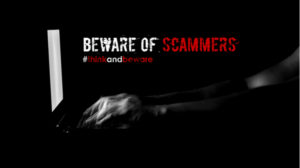
By Arqam Bin Nasir @ Shutterstock.com
The internet and inexpensive digital communications have led to a proliferation of scams via text, email, cell phones, and other forms of communication. Unfortunately, you’re not always prepared to be assailed by someone attempting to steal your money or personal information.
You need to prepare yourself mentally by knowing the signs of a scam BEFORE ahead of time. Bank of America has put together a good list of “Red Flags,” for you to think about. They write:
The most common types of scams will target you through fake emails, text messages, voice calls, letters or even someone who shows up at your front door unexpectedly. No matter which technique the scammer uses, you may be:
- Instructed to not trust Bank of America, or to respond to questions in untruthful ways
- Pressured to send money
- Threatened with law enforcement action
- Told to purchase gift cards and provide codes as a form of payment
- Asked to cash a check for a stranger or send money via wire transfer or Zelle®
- Asked to deposit a check that overpays for something you’re selling, then send the difference elsewhere
Know the best ways to avoid being scammed
Don’t respond: If you’re not 100% certain of the source of the call, email or text, then hang up the phone, don’t click on the link in the email and don’t reply to the text message.
Don’t trust caller ID or answer phone calls from unknown numbers: If you recognize the caller ID but the call seems suspicious, hang up the phone. Phone numbers can be easily spoofed to appear to be from a legitimate caller.
Don’t give out your information: Never provide any personally identifiable information unless you’re absolutely certain the person and reason are legitimate. Remember: Bank of America will never ask you to send us personal information such as an account number, Social Security number or Tax ID over text, email or online.
Research and validate: If the individual or organization seems suspicious, make sure the request being made is legitimate by calling the organization through an official number from their website or consulting with a trusted family member or friend.
Action Line: Keep your circle of contacts small in order to prevent your personal information from getting into too many hands. Build yourself a digital “island” where you and your family are protected.
E.J. Smith - Your Survival Guy
Latest posts by E.J. Smith - Your Survival Guy (see all)
- Is Your Retirement Life a Mess? Let’s Talk - April 18, 2024
- Your Survival Guy Learns from Marie Kondo - April 18, 2024
- Don’t Be Left High and Dry - April 18, 2024
- April RAGE Gauge: Real Gold Prices - April 18, 2024
- This Is about Your Survival, Not Anyone Else’s - April 17, 2024














